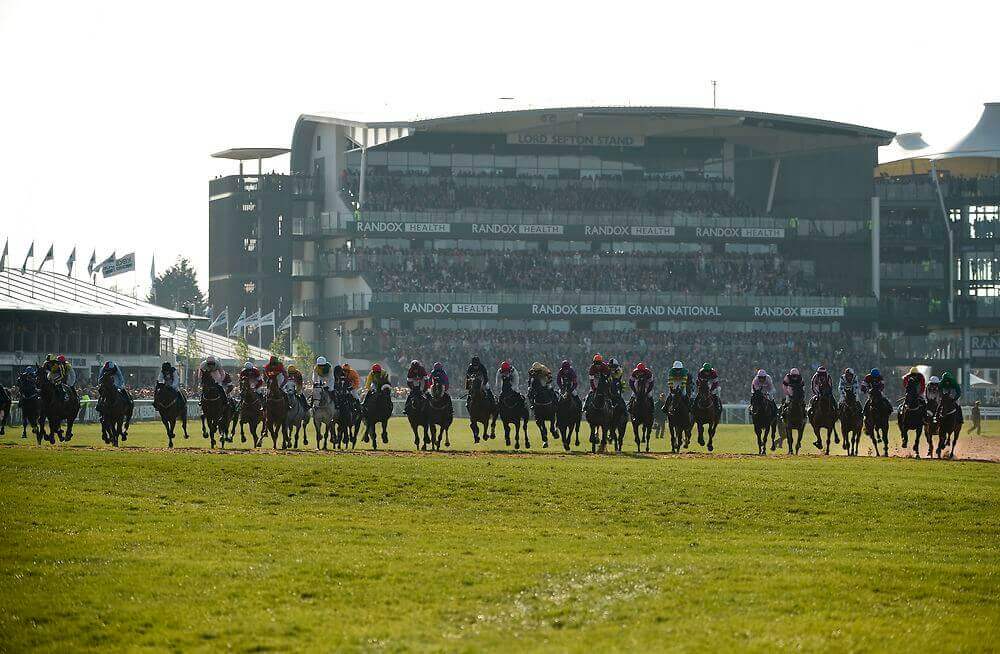Grand National weights and entries 2025
Last Updated 1 Apr 2025 | By The GrandNational.org.uk StaffThe weights for the 2025 Grand National runners have now been confirmed and are listed below. I Am Maximus is top of the list, given 11 stones 12 pounds to carry. That means he’d become the heaviest winner since the legendary Red Rum in 1974.
Grand National weights 2025
Keeping an eye on the weights and any potential changes is crucial for anyone looking to place bets on the race. Now the weights have been revealed, we have a clearer picture of the contenders and can make more informed decisions about the best bets to place.
We’ve compiled a list of the weights for each horse entered to run in the 2025 Grand National, alongside their odds ahead of the race.You can view the data in weight order below, or if you prefer, check out our Grand National runners list, which is sorted by current odds.
| Grand National horses | Grand National weights | 2025 Grand National odds |
|---|---|---|
| I Am Maximus | 11st 12lbs | 9/1 |
| Royal Pagaille | 11st 9lbs | 125/1 |
| Grangeclare West | 11st 8lbs | 28/1 |
| L’Homme Presse | 11st 8lbs | 40/1 |
| Nick Rockett | 11st 8lbs | 22/1 |
| Hewick | 11st 7lbs | 10/1 |
| Minella Indo | 11st 3lbs | 40/1 |
| Conflated | 11st 2lbs | 100/1 |
| Minella Cocooner | 11st 2lbs | 25/1 |
| Stumptown | 11st 2lbs | 8/1 |
| Beauport | 11st 1lb | 33/1 |
| Hitman | 11st 1lb | 150/1 |
| Bravemansgame | 11st | 50/1 |
| Chantry House | 10st 13lbs | 100/1 |
| Perceval Legallois | 10st 12lbs | 16/1 |
| Threeunderthrufive | 10st 12lbs | 66/1 |
| Iroko | 10st 11lbs | 9/1 |
| Kandoo Kid | 10st 11lbs | 20/1 |
| Idas Boy | 10st 10lbs | 150/1 |
| Intense Raffles | 10st 10lbs | 9/1 |
| Senior Chief | 10st 10lbs | 25/1 |
| Broadway Boy | 10st 9lbs | 80/1 |
| Coko Beach | 10st 9lbs | 100/1 |
| Farouk d’Alene | 10st 9lbs | 100/1 |
| Fil Dor | 10st 9lbs | 100/1 |
| French Dynamite | 10st 9lbs | 100/1 |
| Mr Incredible | 10st 9lbs | 150/1 |
| Stay Away Fay | 10st 9lbs | 80/1 |
| Meetingofthewaters | 10st 7lbs | 20/1 |
| Minella Drama | 10st 7lbs | 150/1 |
| Velvet Elvis | 10st 7lbs | 100/1 |
| Celebre d’Allen | 10st 6lbs | 150/1 |
| Fontaine Collonges | 10st 6lbs | 100/1 |
| Horantzau d’Airy | 10st 6lbs | 100/1 |
| Hyland | 10st 6lbs | 25/1 |
| Monbeg Genius | 10st 6lbs | 33/1 |
| Vanillier | 10st 6lbs | 12/1 |
| Minella Crooner | 10st 5lbs | 20/1 |
| Quick Wave | 10st 5lbs | 150/1 |
| Three Card Brag | 10st 5lbs | 25/1 |
| Twig | 10st 5lbs | 80/1 |
| Duffle Coat | 10st 4lbs | 100/1 |
| Roi Mage | 10st 4lbs | 150/1 |
| Shakem Up’arry | 10st 4lbs | 100/1 |
| Fantastic Lady | 10st 3lbs | 100/1 |
| Yeah Man | 10st 3lbs | 66/1 |
| Chemical Energy | 10st 2lbs | 100/1 |
| Macdermott | 10st 2lbs | 66/1 |
| Mister Coffey | 10st 2lbs | 80/1 |
| Mr Vango | 10st 2lbs | 33/1 |
| Desertmore House | 10st 1lb | 100/1 |
| Malina Girl | 10st 1lb | 100/1 |
| Richmond Lake | 10st 1lb | 100/1 |
| La Renommee | 10st | 125/1 |
| King Turgeon | 9st 13lbs | 100/1 |
| Stuzzikini | 9st 13lbs | 100/1 |
| Cruz Control | 9st 12lbs | 150/1 |
| Surrey Quest | 9st 12lbs | 100/1 |
| Apple Away | 9st 11lbs | 150/1 |
| Busselton | 9st 11lbs | 150/1 |
| Spanish Harlem | 9st 11lbs | 150/1 |
| Famous Bridge | 9st 9lbs | 100/1 |
| Escaria Ten | 9st 7lbs | 200/1 |
| Where It All Began | 9st 7lbs | 100/1 |
| Pats Fancy | 9st 3lbs | 150/1 |
*Odds are subject to change and are correct as of 5pm on 28th March 2025.
Find form & odds for Grand National 2025 favourites
Once the weights for the Grand National are announced, the betting markets become significantly more active, as punters can now assess what each horse will have to carry to secure victory at Aintree.
The announcement of the weights also adds an interesting dynamic, as horses are still able to run after the weights are confirmed. This can have a dual effect: some horses who perform well in the lead-up races may rise up the handicap and carry more weight, while others that underperform could drop in the handicap, resulting in a lighter weight. This makes the Grand National even more unpredictable, as both the horses’ form and their handicap weight will play a key role in their chances.
How are Grand National weights determined?
When assigning weights for the Grand National entries, the handicapper considers several factors to ensure a fair and competitive race.
- Past Performance: The horse’s history in previous races is evaluated, with particular attention given to wins, placings, and overall consistency. Horses with a strong record are often assigned higher weights.
- Class of Race: Horses that have competed successfully in higher-class races, such as those at the Cheltenham Festival, may be given heavier weights for the Grand National due to their demonstrated ability at top levels.
- Recent Form: A horse’s performance in recent races is closely scrutinized. Those with good form are likely to carry more weight, reflecting their current ability.
- Distance: The distance of a horse’s previous races is considered. Horses that excel over longer distances may be allocated weights based on their stamina and suitability for the Grand National’s challenging course.
- Track Conditions: The prevailing track conditions, such as ground firmness or softness, play a role in how the handicapper adjusts a horse’s weight. If a horse has struggled in heavy conditions, they may receive more lenient weighting.
Unlike smaller races, where apprentice jockeys may result in a reduction of a horse’s weight, this factor does not apply for the Grand National.
The combination of these factors results in the Grand National handicap. The highest-rated horses are given the top weight of 11-12, with all other runners receiving weights based on this top-rated horse’s allocation.
Weight of previous Grand National winners
Until Many Clouds, no horse carrying more than 11st 7lb had won since Red Rum‘s 1977 third victory, (11st 8lb). However, in the 25 runnings of the Grand National between 1984 and 2009 only one winner (Hedgehunter, 2005) carried more than 11st. The win Don’t Push It in 2010 with 11st 5lb on board heralded a slight change in this trend, with five winners since 2010 carrying 11st or more.
Here are the more recent weights of previous Grand National winners, ordered by weight.
- 11-09 Many Clouds (2015)
- 11-06 Neptunes Collonges (2012)
- 11-06 I Am Maximus (2024)
- 11-05 Tiger Roll (2019)
- 11-05 Don’t Push It (2010)
- 11-00 Ballabriggs (2011)
- 10-13 Tiger Roll (2018)
- 10-11 One For Arthur (2017)
- 10-10 Noble Yeats (2022)
- 10-07 Rule The World (2016)
- 10-06 Pineau De Re (2014)
- 10-05 Corach Rambler (2023)
- 10-03 Auroras Encore (2013)
- 10-03 Minella Times (2021)
Grand National handicap history
The allocation of weights for the Grand National has long been a pivotal factor in determining the chances of trainers, jockeys, and owners, as the Grand National Handicap can either pave the way for glory or create a seemingly insurmountable challenge.
As a handicap race, unlike some other prestigious steeplechases, the Grand National ensures that horses carry varying weights depending on their past performances. The goal of the Grand National handicap is to level the playing field, giving each competitor a fair chance to succeed.
The handicapper’s ideal – though, of course, impossible – outcome is for all horses to finish in a dead heat, but with 34 runners and numerous challenging fences, such a scenario is understandably out of reach. Nonetheless, the aim is to create a competitive and thrilling race where every horse has a fighting chance.
The Grand National is the only race where the British Horseracing Authority’s Head of Handicapping, Dominic Gardiner-Hill, can use his discretion to determine the weights. He can personally select what each horse will carry and can deviate from the normal handicap ratings.
The horse considered a top weight comes to about 11st 10lb and the weights allotted to the other horses are set in relation to this.
Grand National Handicap compressing
We’ve seen some remarkable performances in the Grand National, with horses like Tiger Roll winning with 11st 5lbs in 2019 and Many Clouds shouldering 11st 9lbs to victory in 2015, marking the heaviest winning weight since Red Rum’s triumph in 1974.
Carrying 11st or more was once considered almost impossible, until Hedgehunter defied the odds in 2005 with 11st 1lb, ending a 22-year streak without a horse carrying such a weight. In fact, in 2009, Mon Mome defied expectations, carrying 11st to win the race, and the top four finishers that year all carried 11st or more. The trend continued with the 2010 winner, Don’t Push It, carrying 11st 5lb, while the runner-up, Black Apalachi, had 11st 6lb.
Looking at the modern era, it’s likely that horses like Bobbyjo, who won with 10st in 1999, wouldn’t have made the start line in the last decade. The weight disparity has shifted over time, with the 1999 winner racing 14lbs out of the handicap.
Although Red Rum remains the last horse to win the Grand National off top weight (and the first since the 1930s), it seems that this feat could be repeated in the near future. For instance, Neptune Collonges became the fifth top-weight winner in 2013, and Many Clouds carried the heaviest weight of any winner since in 2015.

Photo by Rept0n1x is licensed under CC BY-SA 3.0
As sporting sights go, few can match the sheer excitement of 40 horses thundering towards the first fence at Aintree in the Grand National.
Grand National weights and entries 2025 FAQ
Find more relevant information when it comes to weights and entries in the Grand National in our FAQs below.
What are the weights in the Grand National?
Each of the Grand National entries will be allocated a weight to carry based on factors including their past form. The top weight is always set at 11st 12lbs, with the lesser horses having to carry as little as 10st 2lbs. You can find a comprehensive list of the weights on grandnational.org.uk
How do weights work in Grand National?
The Grand National is a handicap race. This means each Grand National entry will be allocated a weight depending on its ability. The top weight will have to carry 11 stones 12 pounds. Historically, horses have struggled to win the Grand National whilst carrying in excess of 11 stones, so the Grand National weights announcement has a big impact on the Grand National betting odds.
You might also like…
[wp-review id=”58″]











